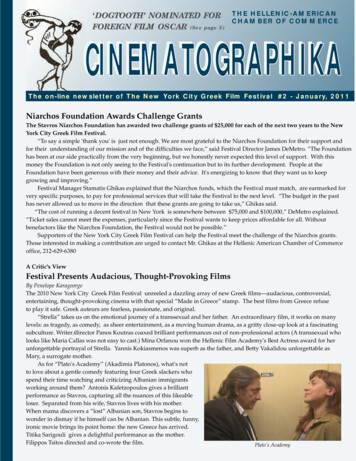
Transcription
‘DOGTOOTH’ NOMINATED FORFOREIGN FILM OSCAR (See page 3)THE HELLENIC-AMERICANCHAMBER OF COMMERCECINEMATOGRAPHIKAThe on-line newsletter of The New York City Greek Film Festival #2 - January, 2011Niarchos Foundation Awards Challenge GrantsThe Stavros Niarchos Foundation has awarded two challenge grants of 25,000 for each of the next two years to the NewYork City Greek Film Festival.“To say a simple 'thank you' is just not enough. We are most grateful to the Niarchos Foundation for their support andfor their understanding of our mission and of the difficulties we face,” said Festival Director James DeMetro. “The Foundationhas been at our side practically from the very beginning, but we honestly never expected this level of support. With thismoney the Foundation is not only seeing to the Festival's continuation but to its further development. People at theFoundation have been generous with their money and their advice. It's energizing to know that they want us to keepgrowing and improving.”Festival Manager Stamatis Ghikas explained that the Niarchos funds, which the Festival must match, are earmarked forvery specific purposes, to pay for professional services that will take the Festival to the next level. “The budget in the pasthas never allowed us to move in the direction that these grants are going to take us,” Ghikas said.“The cost of running a decent festival in New York is somewhere between 75,000 and 100,000,” DeMetro explained.“Ticket sales cannot meet the expenses, particularly since the Festival wants to keep prices affordable for all. Withoutbenefactors like the Niarchos Foundation, the Festival would not be possible.”Supporters of the New York City Greek Film Festival can help the Festival meet the challenge of the Niarchos grants.Those interested in making a contribution are urged to contact Mr. Ghikas at the Hellenic American Chamber of Commerceoffice, 212-629-6380A Critic's ViewFestival Presents Audacious, Thought-Provoking FilmsBy Penelope KarageorgeThe 2010 New York City Greek Film Festival unreeled a dazzling array of new Greek films—audacious, controversial,entertaining, thought-provoking cinema with that special “Made in Greece” stamp. The best films from Greece refuseto play it safe. Greek auteurs are fearless, passionate, and original.“Strella” takes us on the emotional journey of a transsexual and her father. An extraordinary film, it works on manylevels: as tragedy, as comedy, as sheer entertainment, as a moving human drama, as a gritty close-up look at a fascinatingsubculture. Writer/director Panos Koutras coaxed brilliant performances out of non-professional actors (A transsexual wholooks like Maria Callas was not easy to cast.) Mina Orfanou won the Hellenic Film Academy's Best Actress award for herunforgettable portrayal of Strella. Yannis Kokiasmenos was superb as the father, and Betty Vakalidou unforgettable asMary, a surrogate mother.As for “Plato's Academy” (Akadimia Platonos), what's notto love about a gentle comedy featuring four Greek slackers whospend their time watching and criticizing Albanian immigrantsworking around them? Antonis Kafetzopoulos gives a brilliantperformance as Stavros, capturing all the nuances of this likeableloser. Separated from his wife, Stavros lives with his mother.When mama discovers a “lost” Albanian son, Stavros begins towonder in dismay if he himself can be Albanian. This subtle, funny,ironic movie brings its point home: the new Greece has arrived.Titika Sarigouli gives a delightful performance as the mother.Filippos Tsitos directed and co-wrote the film.Plato’s Academy
“The Island” (Nisos), the top grossing film of the year in Greece, is an example of what Greeks do superbly: satire,lampooning themselves in the spirit of Aristophanes. The death of a prominent citizen in a close-knit island village bringsto light the secrets of his fellow citizens. The police chief, the mayor, the priest, the sexy widow, the young son of the policechief who wants to design women's clothing—everyone has a past and a delicious secret to hide. The performances areright-on in this fast-paced, well-written film directed by Christos Dimas. Not always politically correct, the film isoccasionally tasteless but extremely entertaining.“America, America,” a work by the great Greek American Elia Kazan, chronicles his uncle's struggle to go fromAnatolia to the USA. This was Kazan's favorite, and he put his heart and soul into the production. The cinematography isextraordinary as are many of the performances, including the lead played by Kazan discovery Stathis Giallelis. After thescreening, Giallelis, who lives in New York City, was introduced by noted film critic Foster Hirsch. Giallelis offered afascinating look at Kazan, and the making of the film, including Kazan's obsession to get all the details right. Released in1963, the film has been remastered and is available in DVD—a must for any Greek American film lover.“Dark Odyssey,” set mostly in New York's Washington Heights in the 1950s, was written and directed by WilliamKyriakis and Radley Metzger and stars the remarkable Athan Karas. A Greek sailor jumps ship in New York and goeslooking for the man who ruined his sister's life. But the sailor falls in love, goes to a party and dances. Karas, who died lastyear, made an extraordinary contribution to Greek dance in America, and does an unforgettable dance on screen. Cineasteeditor Dan Georgakas, director Metzger and actor Lowell Byers, grandson of Karas, offered their insights on “Dark Odyssey”after the screening.In “Dogtooth” (Kynodontas), the award-winning Greek drama fromyoung director Yorgos Lanthimos, a husband and wife keep theirchildren imprisoned in their house. The teenagers play weird games,learn a language devised by their parents to further cut them off fromthe world, and engage in bizarre, sexless sex. It's funny, offensive, tragicand brilliant. The film played to a packed house at NYUs's Cantor FilmCenter, followed by a panel discussion with Dan Georgakas, CineasteEditor; Vangelis Calotychos, professor, Columbia University; andpsychologist Dr. Thomas Mallios.DogtoothA family man suffers through a midlife crisis in “The Building Manager” (O Diaheiristis). He's caught between the devil(a sexy girl half his age whom he encounters in the Eden-like nursery where he goes to buy trees) and the deep blue sea (hismother) --and, of course, his wife. Hats off to auteur Periklis Hoursoglou, who wrote, directed and starred in the film withhis real life wife Vangelio Andreadaki playing his wife and their two sons cast as sons in the film. This is an absorbing film—warm, human, with an insightful take on contemporary Greek life.Magnificent cinematography characterizes the most unusual “Black Field” (Mavro Livadi), written and directed byVardis Marinakis. The year is 1654. A Janissary (a Greek recruited by force at a young age to serve in the Turkish army) turnsup wounded at a remote cloister. A nun with a dark secret (she's actually a man) nurses him to health. The two flee into thewoods together. Despite a muddled screenplay, the film's eroticism and scenery save it. The Hellenic Film Academy gave thefilm the award for Best Cinematography.“Four Black Suits” (Tessera Mavra Koustoumia) is a comedy written, directed and starring Renos Haralambidis, who alsowrote the film score! Two down and out undertakers, an unsuccessful actor, and an ex-con try to turn their lives around. Onthe promise of a large fee, they carry out the dying wish of a Greek who lived abroad to carry his body on foot from Athensto his native village. We happen to love Haralambidis, so we'll go and see anything he does. This film won the AudienceAward at the Los Angeles Greek Film Festival.“With Heart And Soul,” (Psychi Vathia) written and directed byPandelis Voulgaris, is a Greek Civil War epic focusing on two brotherswho find themselves on opposite sides. Voulgaris, one of Greece'sseminal filmmakers, dedicated the film to the thousands of victims wholost their lives in both sides of the conflict. Wonderful in so many ways,the film offers a great deal to admire—including Voulgaris's heart-rendingdepiction of young fighters who tease each other, kill each other and evenfall in love.“Colossi of Love” focuses on the kamaki suitors, young men whoperfected the art of seducing tourists in the 1970s and 80s. To makethis documentary, director Nikos Mystriotis interviewed many of thekamaki men who waxed nostalgic about the time, the girls, theWith Heart and Souldancing, what they wore, and the fun they had.
“Sugartown: The Day After,” directed by Kimon Tsakiris, is an important documentary that takes an in-depth look atZacharo (Sugartown) in the Western Peloponnese, almost destroyed in the fires of 2007. A total of 45 residents lost their lives,but the money provided to rebuild this community was lost or misused. The mayor behind much of the scandal blatantlytells almost all.Three delightful shorts by Greek American teenagers, winners in the No Limits 2010 competition co-sponsored by TheNational Herald and the New York City Greek Film Festival, rounded out the festival: “De Nada,” directed by Gracie Brett;“Don't Be A Liar: Mafia Stories Part II,” directed by Dennis Latos; and “Aroma, “ directed by Michael Kontaxis.'Dogtooth” Earns Oscar Nomination“Dogtooth” (Kynodontas), the internationally acclaimed film directed by Yorgos Lanthimos, has been nominated forthe Best Foreign Film Oscar by the Academy of Motion Picture Arts and Sciences.“Getting nominated was unexpected. It has made me and my collaborators extremely happy,” said Lanthimos.After its initial showing in Cannes in 2009 where it won the prestigious Un Certain Regard prize, “Dogtooth” has beenshown all over the world at festivals and in commercial bookings. In the United States the film is being distributed byKino/Lorber. It was among the films shown at the recent New York City Greek Film Festival.“This nomination is a fine tribute to Lanthimos,” said NYC Greek Film Fest director James DeMetro. “He has made astrikingly original film that deserves the attention it has received worldwide. But the nomination is also wonderful for theGreek film industry. Greek films are shown all over the world, but the American market has been resistant and unwelcoming.This nomination is bound to attract attention to the Greek film industry. It sends a clear message that Greek filmmakersare turning out world class films that deserve to be seen.”In the past, four Greek language films have been nominated for the Oscar. Two were directed by Michael Cacoyiannis:“Electra” in 1962 and “Iphigenia”in 1977. The other two were directed by Vasilis Georgiadis: “The Red Lanterns”(Kokkina Fanaria) in 1963 and “Blood On The Land” (To Homa Vaftike Kokkino) in 1965. A Greek film hasnever won. The record for most wins in this category is held by Italy, with France a close second.Lanthimos was born in Athens in 1973 and studied film and television direction at the Stavrakos Film School. He hasworked in film, television, and theater.The Oscar winners will be announced in a nation-wide telecast on February 27.“Strella: A Woman's Way”Koutras Talks About His Controversial FilmPanos Koutras, director and co-writer of the controversial film “Strella: A Woman'sWay” was braced for more than the usual share of problems and challenges thatsurround the launch of any film project. The sensitive subject matter of his filmwould inevitably bring forth obstacles that directors working on mainstream projectsdo not normally have to face. In New York City recently as a guest of the OnassisGreek Studies Program at NYU, Koutras spoke about some of the difficulties ofmaking his film, an international sensation and the major hit at the fourth annualNew York City Greek Film Festival.Casting “Strella” was particularly difficult, Koutras said. Mainstreamactors were reluctant to commit to the film which has scenes of graphic sex andnudity and tells the story of a relationship between an ex-con and a male to femaleBetty Vakalidoupre-op transsexual prostitute.“Homophobia manifests itself in different ways, according to the culture of acountry,” Koutras said. “Greece is homophobic. There is an active gay life, butnobody talks about it. There is no 'coming out.' We don't have gay activists or gaypoliticians. In Greece, 95 percent of the transsexuals are sex workers. They don'tget hired as bank employees or even cab drivers. There is much phobia.”The male lead was cast first. Yannis Kokiasmenos , who plays the ex-con, isthe husband of a film editor who has worked with Koutras. “He saw the script andloved it. He is an equestrian and animal rights activist who had done some actingin minor parts. This was his first major role. When he was younger, he was a leftwinger, and playing this part was practically a human rights issue for him. Ithelped that he has an acceptance of his body and is comfortable with his nakedYannis Kokiasmenosness,” Koutras said.
Finding an actress to play Strella was more difficult. “We had been searchingfor months and were just about ready to give up when Mina Orfanou called to testfor the role. When we noticed the real chemistry between Mina and Yanni, we knewwe had found the right people,” Koutras recalled. Both Orfanou and Kokiasmenoswere nominated for top acting awards by the Hellenic Film Academy. Orfanou, apre-op transsexual, went on to win Best Actress. “She was quite happy about that,”Koutras said. “More important than winning the top prize for her was the fact thatshe won it for being an actress, not an actor,” Koutras said.Mina OrfanouThe key supporting role in the film is Mary, a surrogate mother to Strella,strikingly played by Betty Vakalidou. “Betty is an iconic figure,” Koutras explained. “She is the first known transsexual inGreece and is an important figure in Greek gay culture. She was the leader of a short lived gay revolution back in 1977. Shewrote two books that were banned, and she was persecuted
office, 212-629-6380 A Critic's View Festival Presents Audacious, Thought-Provoking Films By Penelope Karageorge The 2010 New York City Greek Film Festival unreeled a dazzling array of new Greek films—audacious, controversial, entertaining, thought-provoking cinema with that special “Made in Greece” stamp. The best films from Greece refuse to play it safe. Greek auteurs are fearless .











